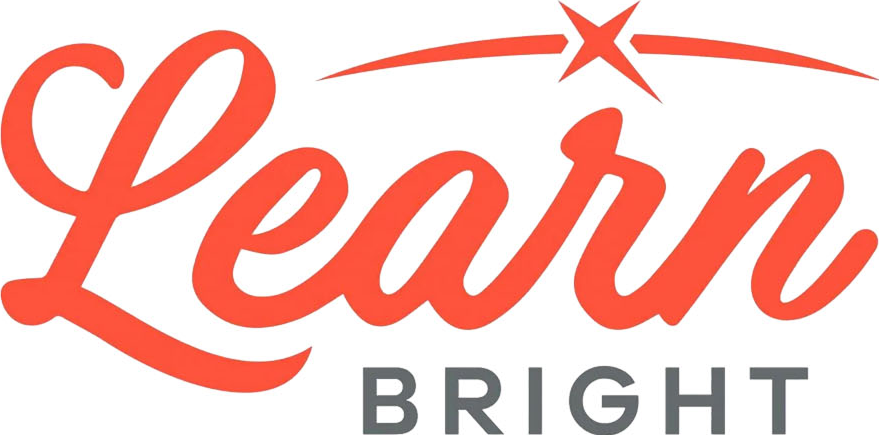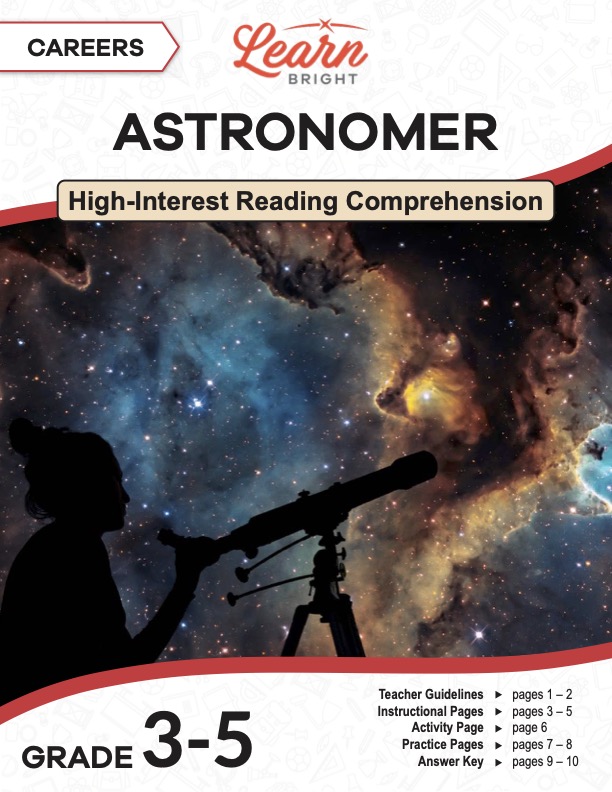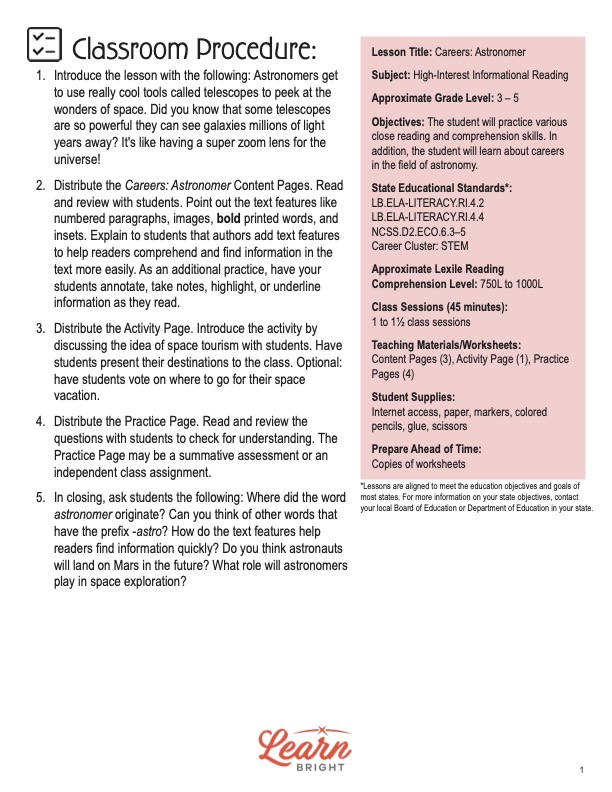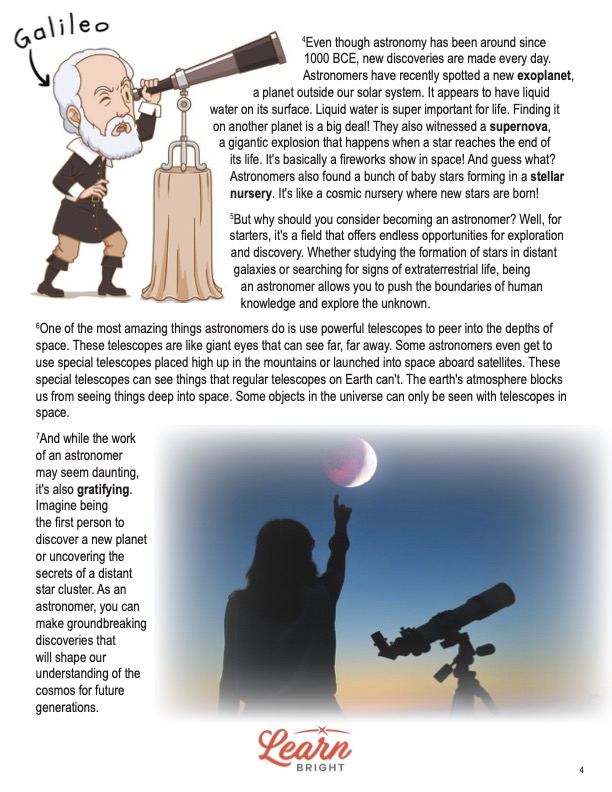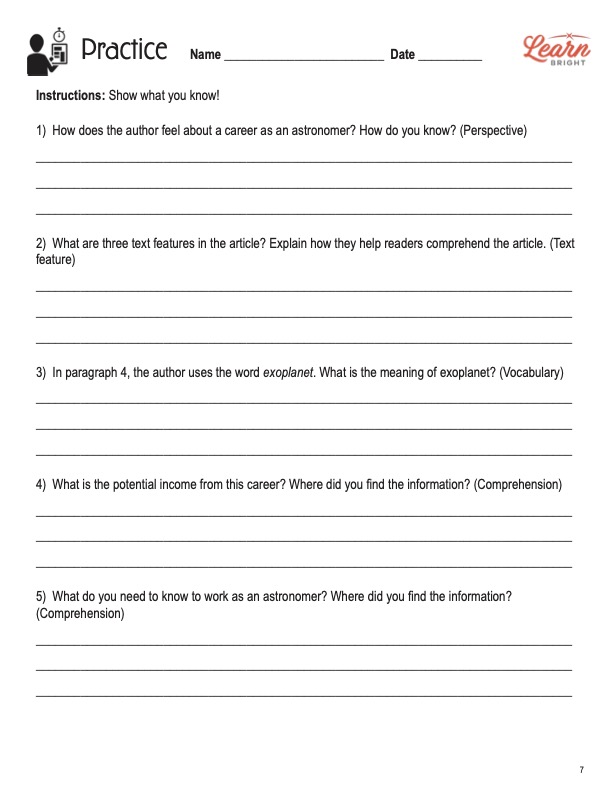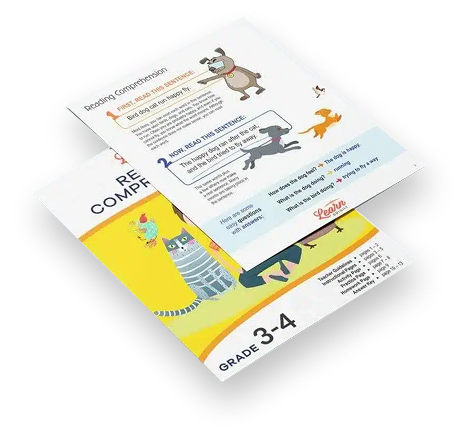Description
What our Careers: Astronomer lesson plan includes
Lesson Objectives and Overview: Careers: Astronomer is a high-interest reading comprehension lesson plan. As such, students will practice various close reading and comprehension skills. In addition, they will learn about careers in the field of astronomy. This lesson is for students in 3rd grade, 4th grade, and 5th grade.
Classroom Procedure
Every lesson plan provides you with a classroom procedure page that outlines a step-by-step guide to follow. You do not have to follow the guide exactly. The guide helps you organize the lesson and details when to hand out worksheets. It also lists information in the yellow box that you might find useful. You will find the lesson objectives, state standards, and number of class sessions the lesson should take to complete in this area. In addition, it describes the supplies you will need as well as what and how you need to prepare beforehand. This lesson requires paper, markers, colored pencils, glue, and scissors. Make sure your students also have access to the internet.
Teacher Notes
The teacher notes page provides an extra paragraph of information to help guide the lesson. It explains that you can teach this lesson in a whole-class setting or as an independent, small-group activity. You can use the blank lines to write down any other ideas or thoughts you have about the topic as you prepare.
CAREERS: ASTRONOMER LESSON PLAN CONTENT PAGES
Introduction to Astronomy
The Careers: Astronomer lesson plan contains three content pages. You might wonder why we’re talking about the career of an astronomer when you’re just starting your journey through school. Well, it’s never too early to think about what you want to be when you grow up. It’s never too early to explore the wonders of the universe! Being an astronomer isn’t just about peering through a telescope.
Astronomy is about unlocking the secrets of the cosmos, understanding the nature of celestial bodies, and pushing the boundaries of human knowledge. So, let’s discuss why becoming an astronomer might be the right path for you. If you’ve ever gazed up at the night sky and felt a sense of wonder, you already have a glimpse into what astronomers do. Have you thought about being an astronaut, going to the moon or to Mars? Then you are an amateur astronomer!
Astronomers study the stars and planets to learn more about how our world works and how life started here. They help us navigate by studying the positions of stars, which allows ships and planes to find their way safely. And remember those incredible pictures of space you see? Astronomers take those pictures, teaching us about the wonders of the cosmos and inspiring us to explore the unknown. So, thanks to them, we can learn more about the universe and how it affects our everyday lives!
Discoveries
Without astronomers, our understanding of the universe would be limited. We would miss out on countless discoveries that have shaped our understanding of the universe. From the big bang theory to the discovery of black holes, astronomers have played a crucial role in advancing our knowledge of space.
Even though astronomy has been around since 1000 BCE, new discoveries are made every day. Astronomers have recently spotted a new exoplanet, a planet outside our solar system. It appears to have liquid water on its surface. Liquid water is super important for life. Finding it on another planet is a big deal! They also witnessed a supernova, a gigantic explosion that happens when a star reaches the end of its life. It’s basically a fireworks show in space! And guess what? Astronomers also found a bunch of baby stars forming in a stellar nursery. It’s like a cosmic nursery where new stars are born!
Why Astronomy?
But why should you consider becoming an astronomer? Well, for starters, it’s a field that offers endless opportunities for exploration and discovery. Whether studying the formation of stars in distant galaxies or searching for signs of extraterrestrial life, being an astronomer allows you to push the boundaries of human knowledge and explore the unknown.
One of the most amazing things astronomers do is use powerful telescopes to peer into the depths of space. These telescopes are like giant eyes that can see far, far away. Some astronomers even get to use special telescopes placed high up in the mountains or launched into space aboard satellites. These special telescopes can see things that regular telescopes on Earth can’t. The earth’s atmosphere blocks us from seeing things deep into space. Some objects in the universe can only be seen with telescopes in space.
And while the work of an astronomer may seem daunting, it’s also gratifying. Imagine being the first person to discover a new planet or uncovering the secrets of a distant star cluster. As an astronomer, you can make groundbreaking discoveries that will shape our understanding of the cosmos for future generations.
Becoming an Astronomer
Astronomers make good money doing what they love! According to the Bureau of Labor Statistics, astronomers earned a median salary of about $143,000 per year. That’s more than many other jobs! But to become an astronomer, you must go to school for a long time and learn a lot. You will want to be in an elementary, middle, or high school STEM program.
You’ll need a bachelor’s degree in physics, astronomy, or a related field, which usually takes about four years of college. Suppose you want to do research or teach at a university. In that case, you’ll probably need to get a master’s or even a doctorate degree, which can take another two to six years. In all, becoming an astronomer takes a lot of hard work and dedication. Still, it can be enriching in the end!
There are many awesome places where astronomers can work, including universities, space agencies, and even some private companies. Believe it or not, the demand for astronomers is growing! That means more and more people are looking for astronomers to help them explore space and discover new things. With all the cool new gadgets and space missions happening, astronomers are in high demand. If you love stars and planets, being an astronomer could be a really exciting career!
The word astronomy comes from a combination of two ancient Greek words: astron, meaning star, and omos, meaning arranging the stars. Astronomers are sometimes referred to as astrophysicists. Astrophysicists focus more on the physics of space and astronomers on the objects in space.
If you have a passion for exploration, a love of science, and a curiosity about the universe, then becoming an astronomer might be the perfect career for you. Whether studying the birth of stars or searching for signs of life on distant planets, being an astronomer allows you to unlock the mysteries of the universe.
CAREERS: ASTRONOMER LESSON PLAN WORKSHEETS
The Careers: Astronomer lesson plan includes two worksheets: an activity worksheet and a practice worksheet. Each one will help students solidify their grasp of the material they learned throughout the lesson. You can refer to the classroom procedure guidelines to know when to hand out each worksheet.
TRAVEL AGENCY BROCHURE ACTIVITY WORKSHEET
For this activity, students will pretend that a travel agency has hired them to create a brochure for a new place in space. The site can be anywhere in the universe. It can be a planet, a restaurant on the moon, and so on. They can get as creative as they want.
Students should first research the destination and gather facts about its size, distance from the sun, and other details. They must use images, fun fact, and enticing descriptions to attract future space tourists. They should also include actual facts about the known universe to make an engaging and informative brochure.
CAREERS: ASTRONOMER PRACTICE WORKSHEET
The practice worksheet requires students to answer a series of 10 questions. These questions all relate to the content pages, so students will need to refer to them often for the answers. In addition, each question provides which reading tool the question corresponds to, such as text feature, vocabulary, or comprehension.
Worksheet Answer Keys
At the end of the lesson plan document is an answer key for the practice worksheet. The correct answers are all in red to make it easier for you to compare them with students’ responses. If you choose to administer the lesson pages to your students via PDF, you will need to save a new file that omits these pages. Otherwise, you can simply print out the applicable pages and keep these as reference for yourself when grading assignments.
